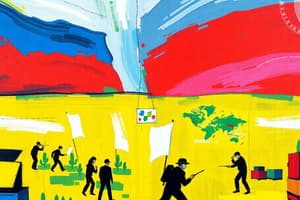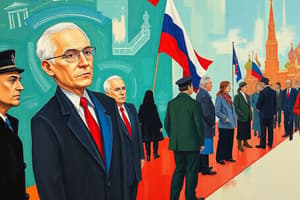Podcast
Questions and Answers
Which political party founded in 1898 respected Marx's ideas and operated as an illegal organization in Russia?
Which political party founded in 1898 respected Marx's ideas and operated as an illegal organization in Russia?
- Russian Communist Party
- Russian Revolutionary Party
- Russian Socialist Workers Party (correct)
- Russian Social Democratic Workers Party
Why did Russian socialists believe that the Russian peasants were natural socialists?
Why did Russian socialists believe that the Russian peasants were natural socialists?
- Because of their periodic land pooling and division based on family needs (correct)
- Because they were influenced by German socialist movements
- Due to their involvement in the Russian Communist Party
- Due to their respect for Lenin's ideas
Why did Lenin believe that not all peasants could be part of a socialist movement?
Why did Lenin believe that not all peasants could be part of a socialist movement?
- Due to their poor work ethic
- Because they were all members of the Russian Communist Party
- Because some were poor and others rich, with differentiations within the group (correct)
- Because they were all united against socialism
What was the main disagreement between the Bolsheviks and Mensheviks regarding organizational strategy?
What was the main disagreement between the Bolsheviks and Mensheviks regarding organizational strategy?
Why did the Russian Socialist Workers Party have to operate as an illegal organization?
Why did the Russian Socialist Workers Party have to operate as an illegal organization?
What did the Russian socialists demand regarding land ownership in Russia?
What did the Russian socialists demand regarding land ownership in Russia?
What did Lenin believe was necessary for the party in a repressive Russia?
What did Lenin believe was necessary for the party in a repressive Russia?
What action did the Russian socialists take through the late nineteenth century in the countryside?
What action did the Russian socialists take through the late nineteenth century in the countryside?
'Differentiation' within the peasants led Lenin to believe that:
'Differentiation' within the peasants led Lenin to believe that:
Study Notes
Economy and Society in Early 20th Century Russia
- By the beginning of the 20th century, approximately 85% of Russia's population earned their living from agriculture, a higher proportion than in most European countries.
- Russia was a major exporter of grain, with cultivators producing for both market and personal needs.
- Prominent industrial areas included St Petersburg and Moscow, where craftsmen undertook much of the production, alongside large factories.
- The 1890s saw the establishment of many factories, driven by the expansion of Russia's railway network and increased foreign investment in industry.
- As a result, coal production doubled and iron and steel output quadrupled by the 1900s.
Working Conditions and Labor Relations
- By the 1900s, factory workers and craftsmen were almost equal in number, with many workers living in poor conditions, surviving on charitable kitchens and living in poorhouses.
- While some workers had strong links with their village origins, others had settled in cities permanently, leading to divisions among workers based on skill and occupation.
- Workers were divided by dress, manners, and occupation, with metalworkers, for example, considering themselves "aristocrats" among other workers due to their higher training and skills.
- Women workers, despite making up 31% of the factory labor force by 1914, were paid less than men, receiving between three-quarters to a man's wage.
Social Unrest and Peasant Life
- Peasants cultivated most of the land, but the nobility, crown, and Orthodox Church owned large properties, leading to resentment among peasants who wanted the land to be given to them.
- Peasants frequently refused to pay rent and even murdered landlords, as seen on a large scale in south Russia in 1902.
- Workers and peasants formed associations to help each other in times of unemployment or financial need, leading to occasional strikes, such as those in the textile industry in 1896-1897 and the metal industry in 1902.
Studying That Suits You
Use AI to generate personalized quizzes and flashcards to suit your learning preferences.
Description
Explore the economic landscape of Russia at the beginning of the twentieth century, where a large majority of the population were agriculturists. Discover how Russia's agriculture sector played a key role in the country's economy as a major exporter of grain.




